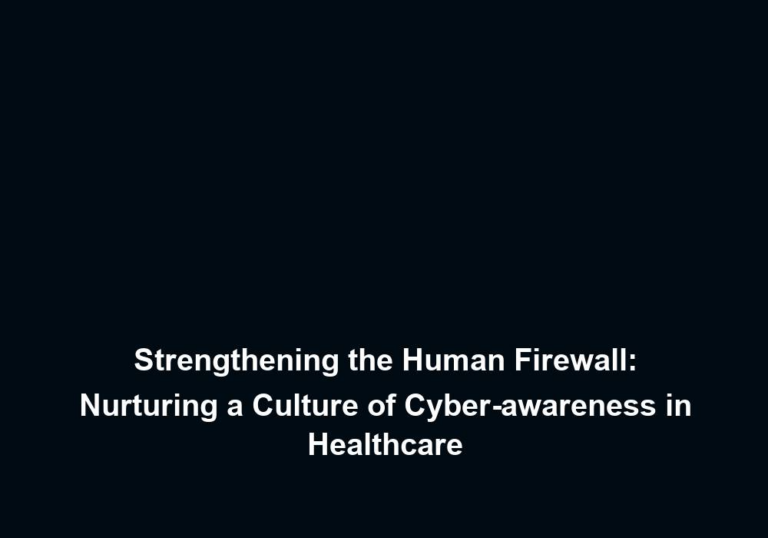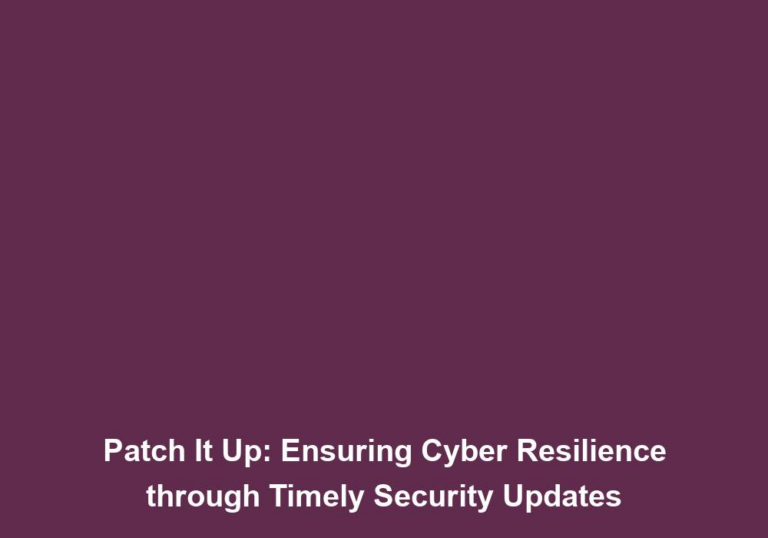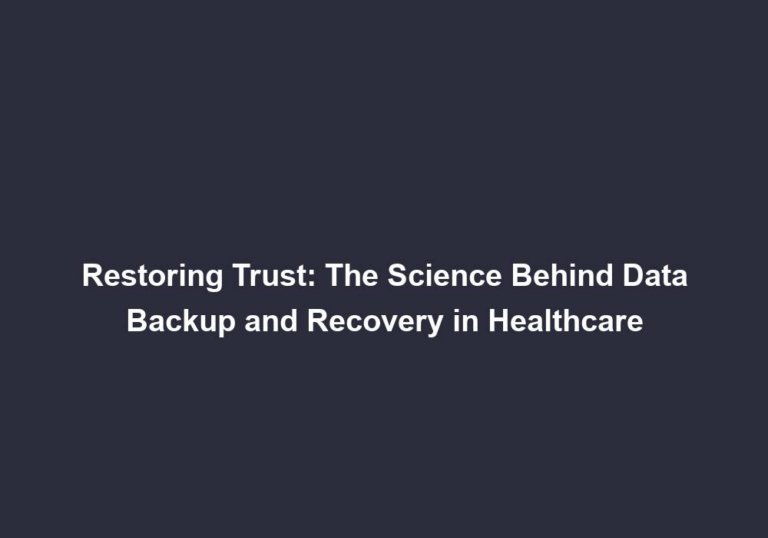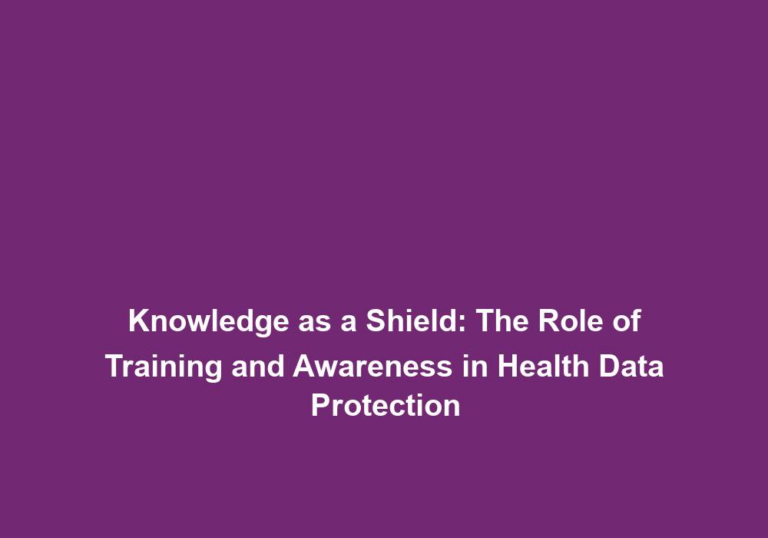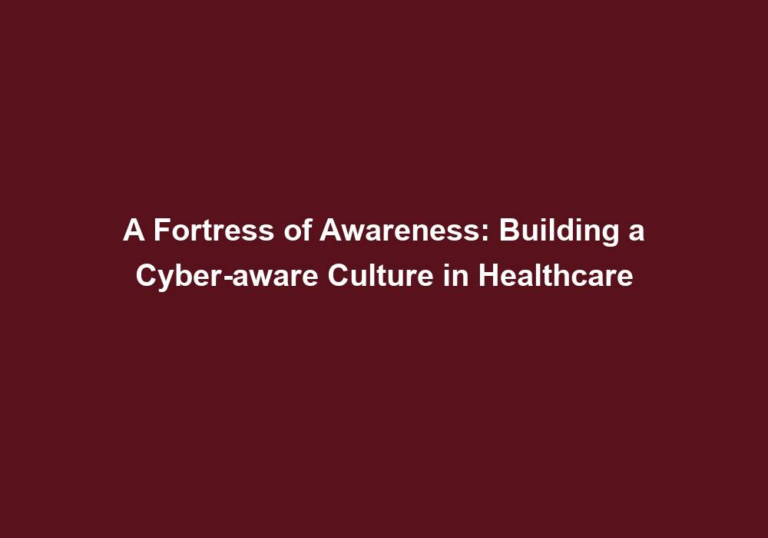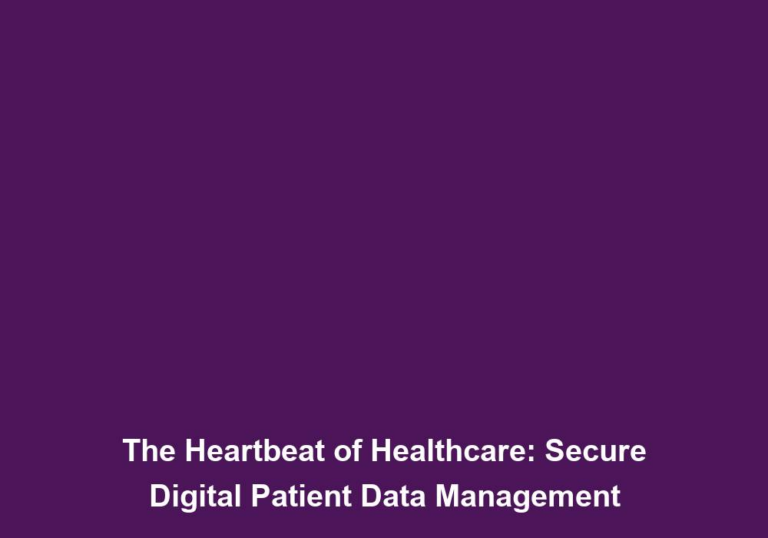From Law to Practice: Upholding Data Protection Standards in Healthcare
In today’s digital age, data protection has become a critical concern, especially in the healthcare industry where sensitive patient information is constantly being handled. With the increasing reliance on electronic health records (EHRs) and the exchange of health data between different entities, it is crucial for healthcare organizations to uphold robust data protection standards. This article explores the importance of data protection in healthcare and provides insights into how healthcare providers can ensure compliance with data protection laws and regulations.
Why Data Protection is Crucial in Healthcare
Data protection in healthcare is of utmost importance due to the sensitive and personal nature of the information being handled. Patient data, including medical history, treatments, and diagnoses, must be safeguarded to protect patient privacy, maintain trust, and comply with legal obligations. Additionally, healthcare organizations have a responsibility to mitigate the risk of data breaches, unauthorized access, and potential misuse of patient information.
Data breaches can have severe consequences for both patients and healthcare providers. Patients may experience identity theft, financial loss, or harm to their reputation if their personal health information falls into the wrong hands. Healthcare providers, on the other hand, may face legal penalties, reputational damage, and loss of patient trust, which can significantly impact their business operations.
To prevent such risks, healthcare organizations must prioritize data protection and establish comprehensive security measures to safeguard patient data throughout its lifecycle. This includes implementing robust authentication and access control mechanisms, encrypting data at rest and in transit, regularly updating and patching software systems, and educating staff about data protection practices.
Laws and Regulations Governing Data Protection in Healthcare
Several laws and regulations exist to ensure the protection of patient data in healthcare. One of the most prominent regulations is the General Data Protection Regulation (GDPR), which applies to the processing of personal data within the European Union (EU) and European Economic Area (EEA). GDPR sets out strict guidelines for the collection, storage, and processing of personal data, including healthcare data. Although healthcare providers in non-EU countries might not be directly subject to GDPR, it is still essential to understand its principles and comply with comparable local regulations.
In the United States, the Health Insurance Portability and Accountability Act (HIPAA) establishes standards for the protection of individually identifiable health information. HIPAA mandates the implementation of administrative, technical, and physical safeguards to ensure the confidentiality, integrity, and availability of patient data. Covered entities, such as healthcare providers, health plans, and healthcare clearinghouses, must comply with HIPAA’s Privacy Rule and Security Rule to protect patient information and avoid penalties.
Healthcare organizations should also stay informed about other relevant data protection laws and regulations specific to their jurisdiction. For example, the California Consumer Privacy Act (CCPA) imposes additional obligations on businesses operating in California, including healthcare providers, regarding the collection and protection of personal information.
Complying with data protection laws and regulations is not only a legal requirement but also an ethical obligation for healthcare providers. By adhering to these laws, organizations can demonstrate their commitment to patient privacy and earn the trust of patients, regulators, and stakeholders.
Best Practices for Upholding Data Protection Standards in Healthcare
To ensure the highest level of data protection in healthcare, organizations should implement the following best practices:
1. Conduct Regular Risk Assessments
Healthcare organizations should regularly assess the risks associated with the collection, storage, and transmission of patient data. This includes identifying vulnerabilities in current systems, evaluating potential threats, and implementing appropriate safeguards to mitigate risks.
By conducting comprehensive risk assessments, organizations can identify and prioritize potential security gaps and vulnerabilities in their systems. This allows them to proactively implement controls and measures to address these risks, reducing the likelihood of data breaches and unauthorized access.
2. Implement Secure Data Storage and Transmission
Healthcare providers should utilize secure methods for storing and transmitting patient data. This includes employing encryption techniques to protect data both at rest and in transit, implementing strong access controls, and regularly patching and updating software to address any security vulnerabilities.
Ensuring secure data storage and transmission is crucial to prevent unauthorized access and protect patient privacy. Encryption helps to render data unreadable to unauthorized individuals, reducing the risk of data breaches. Strong access controls, such as multi-factor authentication and role-based access, restrict access to patient data only to authorized individuals. Regular software updates and patches help to address known vulnerabilities and protect against emerging threats.
3. Train Staff on Data Protection
All staff members who handle patient data should receive comprehensive training on data protection practices and procedures. This includes educating employees on the importance of data privacy, recognizing potential security threats, and following proper protocols for handling and disposing of sensitive information.
Human error is a common cause of data breaches in healthcare. By providing regular training and education to staff, healthcare organizations can enhance awareness and understanding of data protection best practices. Staff should be trained on topics such as password hygiene, phishing awareness, secure email practices, and incident reporting. Ongoing training and refresher courses help to reinforce good data protection habits and ensure compliance with policies and procedures.
4. Establish Data Breach Response Plans
Healthcare organizations should develop and maintain robust data breach response plans. These plans should outline the steps to be taken in the event of a data breach, including notifying affected individuals, cooperating with authorities, and implementing measures to prevent future breaches.
Being prepared to respond effectively to a data breach is crucial for minimizing the impact on patients and the organization. A data breach response plan should include clear roles and responsibilities, contact information for relevant stakeholders, a communication strategy, and steps for containing and investigating the breach. Regular testing and simulation exercises help to ensure that the response plan is effective and can be executed swiftly in a real-life scenario.
5. Regularly Monitor and Audit Data Access
Regular monitoring and auditing of data access is crucial to detect and prevent unauthorized access to patient information. Healthcare providers should implement mechanisms to monitor access logs, track data usage, and promptly investigate any suspicious activities.
By implementing robust auditing and monitoring systems, healthcare organizations can identify and respond to unauthorized access attempts promptly. Access logs help to track who accessed what data, enabling organizations to detect unusual patterns or behaviors. Automated alerts and real-time monitoring tools can provide early warning signs of potential security incidents, allowing for immediate investigation and response.
6. Maintain Data Backup and Disaster Recovery Systems
To ensure business continuity and data availability, healthcare organizations should establish reliable data backup and disaster recovery systems. These systems should be regularly tested to ensure their effectiveness in the event of a data loss or system failure.
Data loss can occur due to various reasons, such as hardware failure, natural disasters, or cyberattacks. By implementing robust data backup and disaster recovery systems, healthcare organizations can minimize the impact of such incidents. Regularly testing these systems helps to ensure their reliability and effectiveness in recovering data and restoring operations in a timely manner.
Conclusion
Upholding data protection standards in healthcare is vital for safeguarding patient privacy, maintaining trust, and complying with legal obligations. By adhering to best practices, such as conducting regular risk assessments, implementing secure data storage and transmission methods, training staff on data protection, establishing data breach response plans, monitoring and auditing data access, and maintaining reliable backup and recovery systems, healthcare organizations can effectively protect sensitive patient information. It is essential for healthcare providers to stay up-to-date with the latest laws and regulations and continuously evaluate and improve their data protection practices to ensure the confidentiality, integrity, and availability of patient data.


